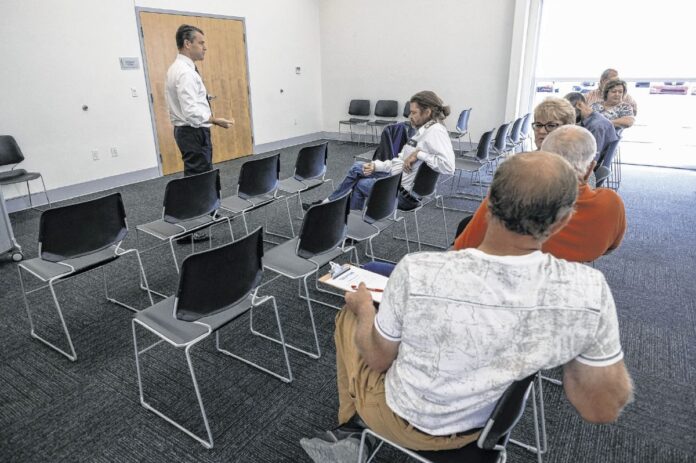
One of Indiana’s Republican senators spent Friday afternoon listening to local farmers’ concerns about how inclement weather is affecting this year’s crop yield and the ongoing effect of the U.S. trade war with China.
Sen. Todd Young, R-Ind., listened to comments that the trade war is drastically affecting the market for U.S. soybeans.
Around 15 people attended Friday’s meeting in the Community Room at Bartholomew County REMC, 1697 W. Deaver Road.
Among the topics brought up by local farmers included increasing federal assistance to help farmers stay afloat given unfavorable weather and market conditions, improving transportation infrastructure to help farmers bring their crops to market and opening up new foreign markets for soybeans to replace Chinese demand for U.S. soybeans, among other topics.
[sc:text-divider text-divider-title=”Story continues below gallery” ]Click here to purchase photos from this gallery
“Let me go on record, I do support (President Donald Trump’s) effort to push back on the Chinese because this situation is only going to get worse,” Young told the crowd during the meeting. “… But, in the meantime, we need mechanisms in place to make sure that you guys can stay in business and get through these times, especially combined with the weather.”
After the meeting, however, Young clarified his position in comments to The Republic, saying he has supported the fact that the Trump administration has “taken action to deal with the Chinese predatory economic behavior,” but stopped short of expressing support for Trump’s decision to levy tariffs on Chinese goods.
Young told the crowd that he believes that the United States striking free trade agreements with other countries, such as Japan, Mexico, Canada and the European Union, could give the United States “some more leverage as we deal with the Chinese.”
However, he said he does not see a quick resolution to the U.S.-China trade dispute.
“I’m not predicting a near-term resolution of the U.S.-Chinese battle,” Young told the crowd. “I actually think this will probably going to be a generational thing where we’re just going to have to stay vigilant because it’s quite difficult to verify and enforce a trade agreement if you have a determined adversary who is pretty intent on cheating. And I believe that is what we have with the Chinese.”
A difficult year for farmers
It has been a particularly tough year for farmers across the country, including in Bartholomew County, the farmers said.
On Friday, China threatened to impose an additional 5% tariff on U.S. soybeans to the 25% tariff it imposed in July 2018, according to The Associated Press. The additional tariff on soybeans would take effect Sept. 1.
Last month, China said it would suspend imports of U.S. agricultural products in response to President Donald Trump’s proposal to add 10% tariffs on another $300 billion in Chinese imports, according to wire reports.
The trade spat largely concerns intellectual property rights of U.S. companies operating in China, including allegations that the Chinese government has been stealing or pressuring U.S. companies to hand over technology involving robotics, artificial intelligence, among other types of technology.
In response to alleged intellectual property theft, the Trump administration started placing punitive tariffs on a host of Chinese goods, prompting China to respond with similar tariffs on a wide range of U.S. goods, including soybeans. China is the world’s largest market for soybeans.
Dan Arnholt, a Bartholomew County farmer who grows soybeans and corn, said he came to the meeting to express concerns about the difficulty of opening new markets for U.S. soybeans, especially if U.S. farmers continue to be blocked from the Chinese soybean market.
“There’s got to be a way to address (U.S.-China trade disputes) rather than just put tariffs on them because tariffs is a non-winning war,” Arnholt told Young. “The American farmer exports 60% of the soybeans they produce. Of that, 60% (of the total) goes to China. …Once you lose a market, it’s hard to get it back. It’s like if you have a bad experience at a restaurant one time even though you’ve gone there 20 years. Would you go back? Probably not. That’s what the soybean market is and the corn market (is). That’s my concern. We’ve already screwed up our markets (in the) short term.”
But even without the U.S.-China trade dispute, it has been a tough weather year for farmers.
The wettest 12 months on record in the continental U.S. placed many American farmers far behind on planting this spring, giving crops less time to reach full maturity and upping the risk that an early frost could kill them off.
In May, the Bartholomew County area had received 5.38 inches of rainfall, compared to a normal May rainfall of 5.12 inches, according to the National Weather Service. However, year-to-date rainfall is up substantially, at about 25 inches of rain so far this year, compared to a normal year to date rainfall of about 18 inches.
Roughly 70% the corn and soybean crops in Indiana were in good or excellent condition at this point last year, according to the U.S. Department of Agriculture’s weekly crop report for Indiana.
This year, only 32% of corn and 33% of soybeans crops planted in the state were in good or excellent condition as of Aug. 18.
“The 2019 Indiana corn and soybean crops were in much worse shape than they were during the same time in 2018,” the report states. “Growers continue to hope for a late killing frost.”
Additionally, AccuWeather has estimated that corn yields will be lackluster across the Midwest this year, including a projected 6.8% drop in corn yield in Indiana.




